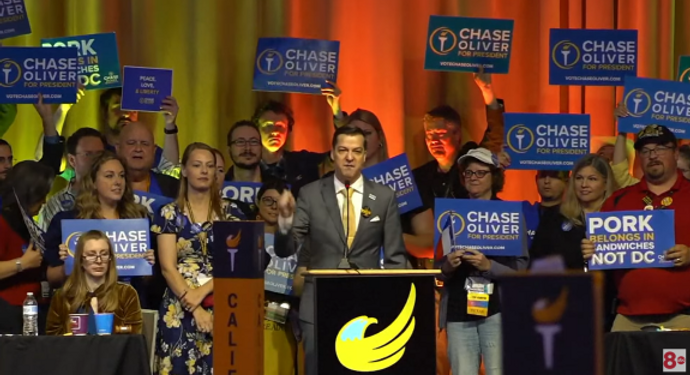The Libertarian Party hosted its presidential nominating convention recently and nominated Chase Oliver as its candidate for President after both former President Donald Trump and

independent Democrat Robert F. Kennedy Jr appealed to delegates for their votes.
The bizarre decision to nominate Oliver, who is about as far from a classical libertarian as we could imagine, demonstrated the power of the radical LBGTQ++ lobby and pushed the national Libertarian organization further into irrelevance.
Contrary to the views of most “rightwing” libertarians, Oliver supports:
Mask and Vaccine mandates
But this vote by the Libertarian Party’s delegates is just the latest in a long line of choices that have moved today’s “political libertarians” away from the principles long espoused by “philosophical libertarians.”
And who can forget the spoiler candidacies of non-classical libertarians who have allegedly been put up and largely funded by Democrat donors as part of a well-considered plan to defeat conservative Republican candidates for United States Senate, Congress and Governor.
For just one example, in his 2016 election, running as a Republican, Rand Paul won with 1,090,177 votes. In 2019 the Libertarian candidate for Governor of Kentucky, John Hicks, booked only 28,436 votes, however that was enough to defeat Republican Matt Bevin who lost to Democrat Andy Beshear by only 5,333 votes.
As CHQ Chairman Richard Viguerie explained in his book TAKEOVER:
…the arguments against a third-party are the same now as they were when Bill Buckley and Ayn Rand first jousted over where conservatives should find their political home a half a century ago. The bottom line is that while third-party movements, such as Libertarians, have gained some recognition and added to their numbers, they haven’t actually been electing candidates to office.
Limited-government constitutional conservatives running as Republicans win, but the same candidates, with the same ideas, running as Libertarians, lose…
When Libertarians run their own third-party candidates, as they are certainly free to do, they all too often split the twenty-first century conservative coalition and hand victory to Big Government Democrats—as they did in Virginia’s 2013 gubernatorial election. The greatest challenge limited-government constitutional conservatives running as Republicans will have in future elections where there is a Libertarian Party candidate on the ballot is to earn enough support from liberty-minded voters, who might be inclined to vote for a Libertarian candidate, to achieve a plurality in the election— and the only way to do that is to campaign on and deliver limited constitutional conservative government.
The good news this election cycle is that the national Libertarian Party’s choice of radical homosexual advocate Chase Oliver may splinter that national party along Right – Left lines.
And take a look at this…
In this crucial 2024 election former President Donald Trump is the pro-liberty candidate for President. Trump is our best hope to rid ourselves of Joe Biden and rein-in Big Government and with control of the House and Senate hanging in the balance, we urge our libertarian-leaning friends to take a hard look at Chase Oliver’s anti-liberty record before they waste their vote on a decidedly anti-liberty candidate.












